 There are many different benefits that companies can attribute to their use of modern heat exchangers for their electrical thermal management needs. For example, lower energy costs are common as heat exchangers significantly less energy than other, more traditional solutions (like air conditioning). Also, companies can reduce the amount of floor space that they have to dedicate to their thermal management apparatus. Yet, the everyday benefits of operating their businesses aren’t the only advantages that companies can thank heat exchangers for. In many cases, some of the most advanced technologies have been made possible thanks to heat exchangers’ more efficient and manageable thermal management processes. (more…)
There are many different benefits that companies can attribute to their use of modern heat exchangers for their electrical thermal management needs. For example, lower energy costs are common as heat exchangers significantly less energy than other, more traditional solutions (like air conditioning). Also, companies can reduce the amount of floor space that they have to dedicate to their thermal management apparatus. Yet, the everyday benefits of operating their businesses aren’t the only advantages that companies can thank heat exchangers for. In many cases, some of the most advanced technologies have been made possible thanks to heat exchangers’ more efficient and manageable thermal management processes. (more…)
Safer Electrical Cooling in Hazardous Locations
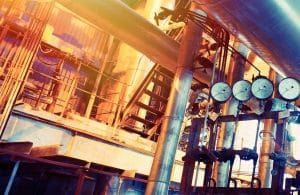 For companies in most industries, it’s been a fairly long time since electrical thermal management was such a burden. In the decades since heat exchangers and other custom thermal solutions have gained a hold, they’ve transformed the way companies approach thermal management and the costs that were often associated with it. However, that hasn’t been true for every industry, particularly those that operate in particularly harsh and hazardous locations. While conventional heat exchangers are highly convenient, they weren’t initially designed to provide the high level of safety and protection required. Now, however, specialized heat exchangers can provide safer electrical cooling in hazardous locations, as well, helping more industries benefit from their significant advantages. (more…)
For companies in most industries, it’s been a fairly long time since electrical thermal management was such a burden. In the decades since heat exchangers and other custom thermal solutions have gained a hold, they’ve transformed the way companies approach thermal management and the costs that were often associated with it. However, that hasn’t been true for every industry, particularly those that operate in particularly harsh and hazardous locations. While conventional heat exchangers are highly convenient, they weren’t initially designed to provide the high level of safety and protection required. Now, however, specialized heat exchangers can provide safer electrical cooling in hazardous locations, as well, helping more industries benefit from their significant advantages. (more…)
How Heat Exchangers Outperform Air Conditioning
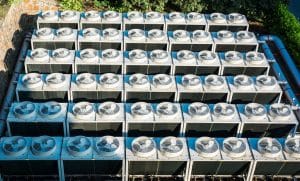 Ever since companies began using technology for much of their operations, they’ve also been highly reliant on electrical thermal management systems that stop their equipment from overheating. Traditionally, this created a gauntlet of high energy usage, high costs, and frequent downtime that companies had to accept as par for the course. However, today, more and more companies are turning to advanced heat exchangers to meet their electrical thermal management needs, instead. In many different applications, heat exchangers outperform conventional air conditioning units in several important ways, making thermal management much less of a burden. (more…)
Ever since companies began using technology for much of their operations, they’ve also been highly reliant on electrical thermal management systems that stop their equipment from overheating. Traditionally, this created a gauntlet of high energy usage, high costs, and frequent downtime that companies had to accept as par for the course. However, today, more and more companies are turning to advanced heat exchangers to meet their electrical thermal management needs, instead. In many different applications, heat exchangers outperform conventional air conditioning units in several important ways, making thermal management much less of a burden. (more…)
How Phase-Change Cooling Transforms Thermal Management
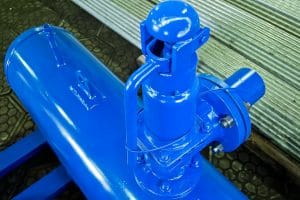 The way companies and technology designers have approached thermal management has changed dramatically over the years. In many cases, one of the greatest of those advancements has been the advent of phase-change cooling, which employs the natural properties of an eco-friendly cooling fluid to rapidly and efficiently transfer electrical waste heat. Phase-change cooling involves absorbing waste heat in a way that doesn’t allow for any rise in temperature within an electrical enclosure, and then transferring that heat to be dissipated safely elsewhere. (more…)
The way companies and technology designers have approached thermal management has changed dramatically over the years. In many cases, one of the greatest of those advancements has been the advent of phase-change cooling, which employs the natural properties of an eco-friendly cooling fluid to rapidly and efficiently transfer electrical waste heat. Phase-change cooling involves absorbing waste heat in a way that doesn’t allow for any rise in temperature within an electrical enclosure, and then transferring that heat to be dissipated safely elsewhere. (more…)
How Efficient Are Air-to-Air Thermal Solutions?
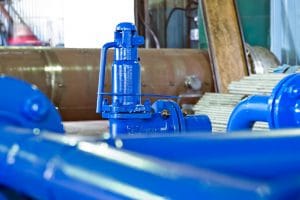 It’s a fact of life that electrical components generate heat as they operate. It’s also a fact that, if not managed properly, that waste heat can quickly accumulate within an electrical enclosure and lead to extensive, devastating damage. The point of electrical thermal management is to prevent this from happening, and there are several ways to accomplish this. For example, the point of modern heat exchangers is to make the cooling process much more efficient than traditional solutions, often by providing air-to-air thermal management that offers substantial benefits over conventional HVAC or air compression units. (more…)
It’s a fact of life that electrical components generate heat as they operate. It’s also a fact that, if not managed properly, that waste heat can quickly accumulate within an electrical enclosure and lead to extensive, devastating damage. The point of electrical thermal management is to prevent this from happening, and there are several ways to accomplish this. For example, the point of modern heat exchangers is to make the cooling process much more efficient than traditional solutions, often by providing air-to-air thermal management that offers substantial benefits over conventional HVAC or air compression units. (more…)
Important Roles of Electrical Thermal Management
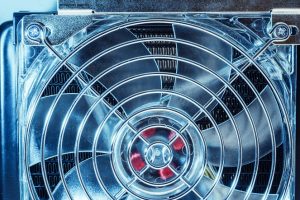 In the realm of electrical thermal management, the most impactful innovations have been those that companies utilize most frequently for their industrial thermal management needs. In many cases, those include modern heat exchangers of various types that are designed to effectively control electrical waste heat within enclosures of all sizes. However, because of the importance of electrical thermal management to most modern technologies, those impacts have also been felt everywhere else, including in many of today’s most important consumer electronics and technologies. (more…)
In the realm of electrical thermal management, the most impactful innovations have been those that companies utilize most frequently for their industrial thermal management needs. In many cases, those include modern heat exchangers of various types that are designed to effectively control electrical waste heat within enclosures of all sizes. However, because of the importance of electrical thermal management to most modern technologies, those impacts have also been felt everywhere else, including in many of today’s most important consumer electronics and technologies. (more…)
Using Heat Exchangers for Below-Ambient Cooling
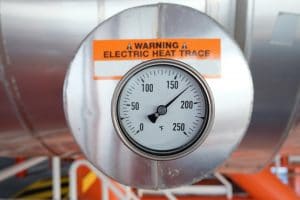 When it comes to high-performance electrical thermal management, heat exchangers that provide efficient, ambient cooling are often more than enough to prevent electrical overheating. Despite using natural methods to transfer heat, they can often offer cooling solutions that are just as powerful and usually more efficient than older solutions, such as HVAC equipment. The one thing ambient heat exchangers can’t do, though, is cool applications to below the ambient temperatures outside of electrical enclosures. However, for applications that require it, heat exchangers can be designed to achieve below-ambient cooling to help even more companies enjoy more efficient and affordable thermal management. (more…)
When it comes to high-performance electrical thermal management, heat exchangers that provide efficient, ambient cooling are often more than enough to prevent electrical overheating. Despite using natural methods to transfer heat, they can often offer cooling solutions that are just as powerful and usually more efficient than older solutions, such as HVAC equipment. The one thing ambient heat exchangers can’t do, though, is cool applications to below the ambient temperatures outside of electrical enclosures. However, for applications that require it, heat exchangers can be designed to achieve below-ambient cooling to help even more companies enjoy more efficient and affordable thermal management. (more…)
The Greenest Qualities of Modern Heat Exchangers
 There are many different aspects and qualities of modern heat exchangers that benefit companies in many different ways. In everything from saving energy and overhead costs to streamlining overall operations and more, more companies continue to take advantage of the myriad benefits that heat exchangers offer. Among those benefits, the ability to make electrical thermal management and several other processes greener and more environmentally friendly has become one of the more important. (more…)
There are many different aspects and qualities of modern heat exchangers that benefit companies in many different ways. In everything from saving energy and overhead costs to streamlining overall operations and more, more companies continue to take advantage of the myriad benefits that heat exchangers offer. Among those benefits, the ability to make electrical thermal management and several other processes greener and more environmentally friendly has become one of the more important. (more…)
Making Thermal Management More Productive
 For companies that are looking to boost their efficiency and productivity, there are many different areas of operations for them to concentrate on. For example, certain production processes may be redundant and can be streamlined to reduce time and resources. Some systems may not operate at optimal efficiency and can stand to be upgraded. For many companies, the solutions they use for their electrical thermal management is another important area that can stand a boost in productivity. With heat exchangers, they can implement more reliable and effective ways to keep their electrical enclosures and equipment properly cooled. (more…)
For companies that are looking to boost their efficiency and productivity, there are many different areas of operations for them to concentrate on. For example, certain production processes may be redundant and can be streamlined to reduce time and resources. Some systems may not operate at optimal efficiency and can stand to be upgraded. For many companies, the solutions they use for their electrical thermal management is another important area that can stand a boost in productivity. With heat exchangers, they can implement more reliable and effective ways to keep their electrical enclosures and equipment properly cooled. (more…)
What Is a Heat Exchanger Feasibility Study?
 The basic principles of how heat exchangers transfer waste heat has been the cornerstone of how they’ve helped transform the realm of electrical thermal management. Their significant benefits when compared to more traditional thermal solutions have made them an obvious choice for companies that want to streamline their electrical thermal management and overall operations. However, the expansive growth of heat exchangers and their use in increasingly more applications is also due to the advanced methods that many manufacturers use to design and produce them. Those methods often include a comprehensive feasibility study, during which multiple teams of experts collaborate to analyze and test a particular cooling solution’s design to ensure that it will be effective. (more…)
The basic principles of how heat exchangers transfer waste heat has been the cornerstone of how they’ve helped transform the realm of electrical thermal management. Their significant benefits when compared to more traditional thermal solutions have made them an obvious choice for companies that want to streamline their electrical thermal management and overall operations. However, the expansive growth of heat exchangers and their use in increasingly more applications is also due to the advanced methods that many manufacturers use to design and produce them. Those methods often include a comprehensive feasibility study, during which multiple teams of experts collaborate to analyze and test a particular cooling solution’s design to ensure that it will be effective. (more…)







